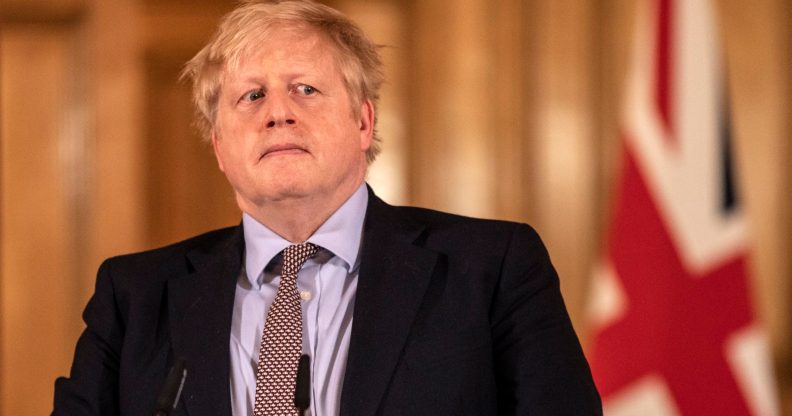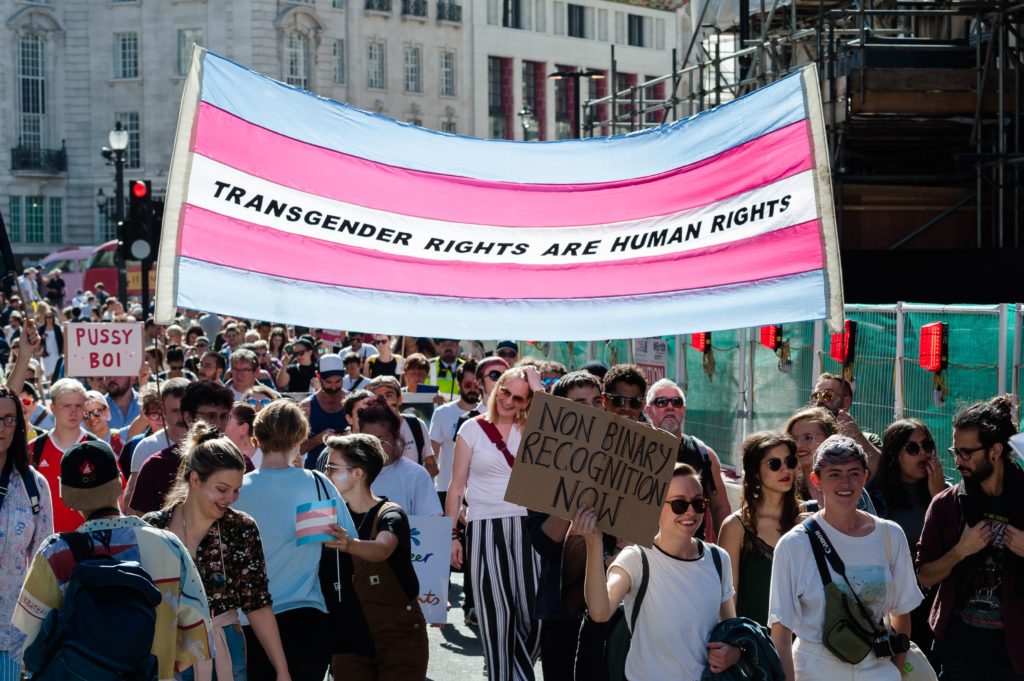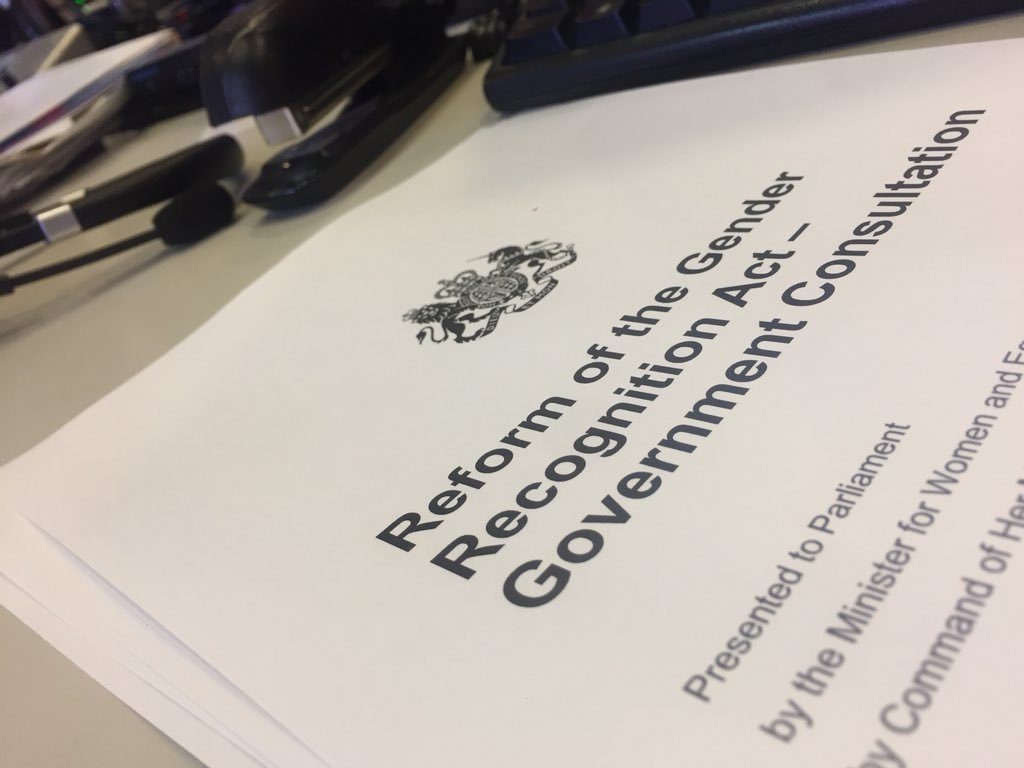Boris Johnson is scrapping long-overdue plans to allow trans people to self-ID despite overwhelming public support, report claims

Boris Johnson. (AFP via Getty/ RICHARD POHLE/POOL)
The British government, after spending a gruelling two years stalling the results of a public forum to decide the future of trans rights, have opted to not listen to the public at all and allegedly ignore and ditch considerations for a self-identifying (self-ID) system altogether.
The crucial legislative reforms which would have made it easier for people to change their gender will reportedly be abandoned and replaced with a series of pad-locked policies to better “protect” single-sex spaces.
Premier Boris Johnson and his ministers will allegedly shelve the plans developed under Theresa May’s government and instead “placate” the LGBT+ community, journalist Tim Shipman wrote, by announcing a ban on conversion therapy following an outcry.
An insider told The Sunday Times that government’s response to the public consultation is “basically ready” and will be announced at the end of July. But concern has been raised from trans activists who note that the response has, for the most part, little to do with reforms to the GRA and more to do with single-sex spaces.
The new legislation is likely to be introduced later this year or early next year, the source said. While a second “government source” said that the prime minister will have “final say the recommendations”.
Single-sex spaces are protected under the Equality Act 2010, and the Tories were very clear when they set out plans for GRA reform in 2018 that they were “not proposing any amendments to the Equality Act 2010“.
Spearheaded by Liz Truss, the minister for women and equalities earlier this year announced changes to the access trans youth have to healthcare which has been protested by tens of thousands of people, provoked concern from the official LGBT+ group of every UK political party and caused alarm among parents of trans youth.
The alarm has focused on Truss’ comments regarding access to healthcare for trans youth and trans women’s access to single-sex spaces, neither of which are currently covered by the GRA.
Despite 70 per cent backing self-ID for trans people, British government will shelve GRA reforms, source says.
It truly caps off a dispiriting time for trans Britons, where the topsy-turvy fight for equality became a drawn-out battle steeped in transphobic vitriol from some lawmakers and anti-trans groups determined to stymie the life-changing reforms.
Trans folk have, in the meantime, been subjected to rocketing rates of discrimination against them, whether it be the biting words from columnists or transphobia that curdles into violence.

Thousands of transgender people and their allies take to the streets for London’s first ever Trans+ Pride march on 14 September, 2019. (WIktor Szymanowicz/NurPhoto via Getty Images)
In short, the government announced an avenue to reform the 2004 Gender Recognition Act (GRA) – the bedrock of gender recognition law in the UK – to make it easier for trans folk to acquire a Gender Recognition Certificate, which, in the eyes of the law, recognised that their gender identity matches that of their sex.
It’s governed the process by which trans people can update the gender marker on their birth certificates for the last 16 years.
And according to the insider, more than 100,000 responses were received to a public consultation on how to change the GRA. An overwhelming 70 per cent backed self-declaration, but officials felt the results were “skewed by an avalanche of responses generated by trans rights groups”.
However, in a poll put to the general public, 56 per cent of people were in favour of trans people being able to self-identify their gender. It remains unclear whether the YouGov poll was similarly “skewed” by trans rights groups somehow.
Indeed, for trans Britons, the wish to carry out a mundane life, blandly using public bathrooms, visiting a GP or trying out discounted clothing in retailers, is a dream apparently too much to be asked.
Liz Truss will allegedly announce ban on conversion therapy in July.
Now, the insider claimed, a slew of new policies will be announced constellating around the GRA. For example, “safeguards” will be enforced to protect single-sex safe spaces, “reaffirming provisions in the Equality Act.”

Liz Truss has faced fierce criticism from LGBT+ groups and allies for her plans to reform the Gender Recognition Act. (Luke Dray/Getty)
While guidelines will be introduced to streamline public lavatories across Britain’s patchwork of local authorities which have “given rise” to gender-neutral facilities.
Local authorities follow the Equality Act, which states that “gender reassignment” is a protected characteristic. As a result, trans men are entitled to access the same facilities and services as other men and that trans women are entitled to access the same facilities and services as other women.
While under the 2004 GRA, “where a full gender recognition certificate is issued to a person, the person’s gender becomes for all purposes the acquired gender.” Moreover, the protection still applies before the certificate itself is issued, for as long as the trans individual can demonstrate they are pursuing a GRC, such as socially living in their defined gender which includes restrooms.
Finally, the plank of the policy changes will be a ban on conversion therapy, which will, the source said, apply to both church groups and therapists. It remains unclear whether the ban will involve wholesale regulation of all psychotherapists and counsellors.
Trans activists and allies express disbelief, sadness and a complete lack of surprise at alleged scrapping of GRA reforms.
Throughout nightfall, weary LGBT+ activists expressed their exhaustion at the alleged government move.
Anger mingled with sadness, while many simply aired their lack of surprise at the reported news considering that, after all, successive equalities ministers have repeatedly kicked plans into the long grass.
The Conservative Party literally spent two years on a consultation for the Gender Recognition Act, then completely ignored it because they didn't like the results pic.twitter.com/gbEcMGXdXK
— Sam ✌️ (@samisam147) June 13, 2020
Literally what the fuck was the point of the GRA if they're going to ignore the result? I mean, wasn't Brexit an 'advisory' referendum? If we have to leave the EU because 52% of the public wanted it, the 70% of people who reported favourably to the GRA must be respected. AGHAGH— Amrou Al-Kadhi ? (@Glamrou) June 14, 2020
UK public less transphobic than government hoped, incredible https://t.co/FlzlvtuC0t— Arthur Webber ??️? (@BernieTranders) June 13, 2020
I'm too tired to tweet anything about the scrapping of the UK GRA reform. It's a kick in the teeth to a community that's already suffering so much, from lack of access to healthcare, legal recognition & the horrible culture war we didn't ask for.— Alexa Moore (@alexadotm) June 13, 2020
Apparently an attempt is to be made by the British government to “placate” LGBT people.
I can’t imagine that being problematic. https://t.co/1JrwlmbCJF
— Matt Wells (@MatthewWells) June 14, 2020
The govt is to ban ‘gay conversion’ therapy to placate the LGBT community while refusing trans people their rights.
Well, fuck you. So long as some of us are unequal, all of us are unequal. The gay people of this country won’t let you get away with this divide and rule. https://t.co/8UytiwYnW5— Benjamin Butterworth (@benjaminbutter) June 13, 2020
i mean, in the current political climate, there’s really nothing surprising about what’s on the front page of the sunday times ??♂️… but, in a democratic society, how do you even begin to defend scrapping the proposed GRA reforms, when responses were overwhelmingly in favour? ??♂️— Dr Adrian Harrop (@AdrianHarrop) June 13, 2020
We will beat this friends. There are more people than ever before paying attention now. We will squash transphobia, I promise.— margaret gotwood (@notCursedE) June 13, 2020
Gender Recognition Act: a quick guide.
The GRA is the mechanism that allows trans people to apply for a Gender Recognition Certificate (GRC) and change the gender on their birth certificate.

The public consultation on the Gender Recognition Act was answered by over 100,000 people. (Conatus News)
Currently, trans people must prove they have lived in their gender for two years and have a medical diagnosis of gender dysphoria, after which their application for a GRC is approved – or refused – by a panel of people who don’t meet them.

